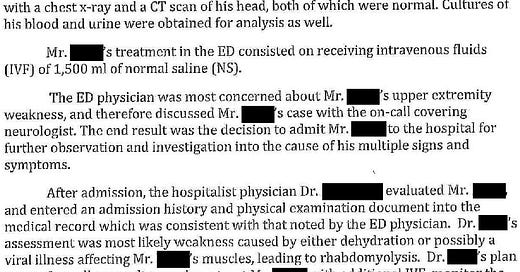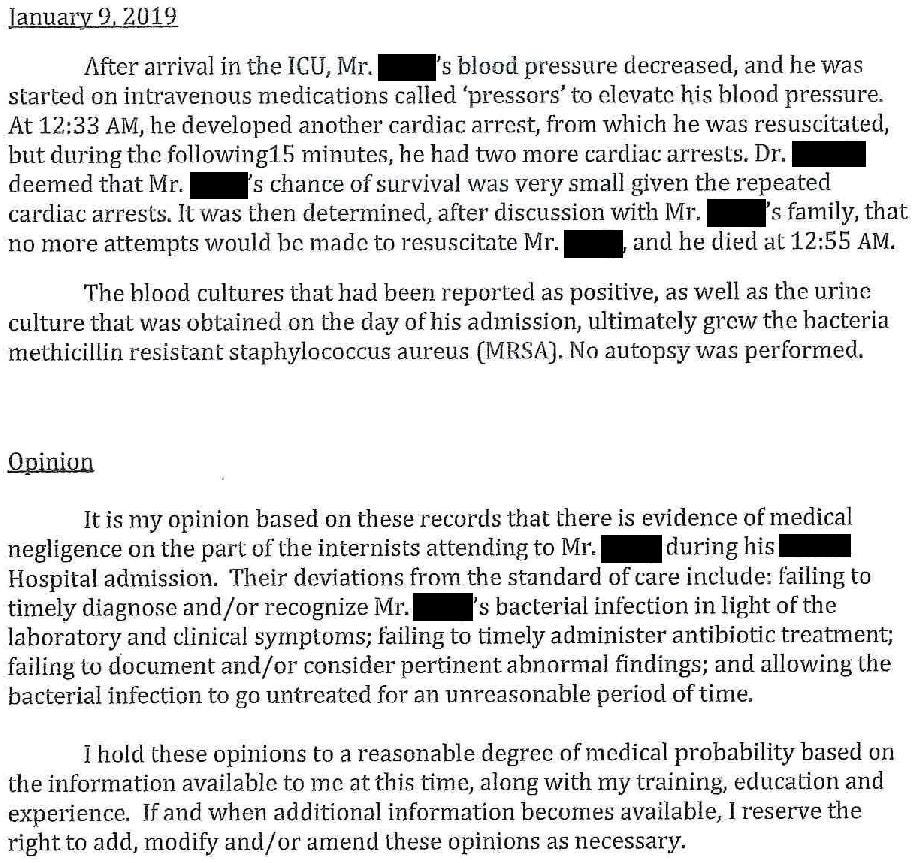A 65-year-old man presented to the ED with multiple vague symptoms.
He was weak, had generalized back pain, vomiting, and diarrhea.
Vitals showed mild tachycardia but otherwise were normal.
He was an attorney and politician in the state legislature.
The patient was given 1.5L of normal saline.
Labs showed an elevated CK.
CXR and CT scans were reassuring.
He was admitted to the hospitalist.
The nurses took his temperature once he made it to the floor, and he had a fever.
The next day both blood cultures were positive for Gram positive cocci.
For unclear reasons, the patient was not started on antibiotics.
He continued to worsen until he had a cardiac arrest just before midnight.
The rapid response team got ROSC.
They then realized the issue, and started vanc/Zosyn.
After transfer to the ICU, he coded again within minutes and tragically died.
Join 7900+ doctors and attorneys on the email list.
His family hired an attorney and sued the hospital and several physicians.
Specifically, they sued 2 physicians:
the hospitalist who admitted the patient
the hospitalist who took the phone call the next morning about the positive cultures.
They did not sue the ER physician.
The 2 sides reached a confidential settlement.
MedMalReviwer Analysis:
I’m going to guess that both hospitalists assumed that antibiotics had already been started when they each became involved in his care. There’s a lot of diagnostic and therapeutic inertia that patients carry with them from the ED to the hospital floor. Doctors on both sides of this handoff need to communicate clearly and do a careful independent review of the case.
Antibiotic stewardship is important but failing to give antibiotics when needed can be fatal. It’s far better for a patient to receive 1-2 doses of antibiotics at admission and then have them de-escalated by the inpatient team.
Bacteremia presents a diagnostic challenge because its one of the few infectious source that can’t be definitively diagnosed prior to admission. Its especially challenging in the early stages, when the patient has vague symptoms without the classic vital sign abnormalities seen in sepsis. EM physicians need to maintain a high index of suspicion and hospitalists need to have an understanding attitude when patients don’t have a neatly packaged diagnosis at admission.
Most medical errors are a failure to do the basics. Not a failure to make challenging diagnoses or use cutting edge techniques. Starting IV antibiotics for a patient with bacteremia and sepsis is extremely basic.
I’m a little surprised that the ED doctor wasn’t named as a defendant. Based on what we know (admittedly not complete information) this is how I’d assign fault:
ED doctor: 15%
Admitting hospitalist: 15%
Next hospitalist: 70%
How would you assign fault in this case? Leave a comment!
Would you consider buying an annual subscription?
It helps cover the time that I put into writing these cases and makes it possible for me to release free cases for trainees.
Thanks in advance!
Related case:
The very first case I ever published involved a delay in giving antibiotics, which resulted in a 37-year-old pregnant woman (a physician herself!) dying of sepsis:









So, every ED patient with generalized weakness and leukocytosis needs antibiotics? That does not seem like good medicine.
I agree with the assignment of negligence to ED physician and hospitalist services. The lab data on admission clearly pointed towards sepsis among leading differential and ED physician should have considered this in his assessment. Admitting hospitalist, in my experience, just copy and paste ED assessment ( generally done by APP) and leave it to rounding hospitalist next day to figure out what to do. Unfortunately this scenario is quite common with modern medicine where care is extremely fragmented, and hospitalist have the excuse of having “too many patients”.